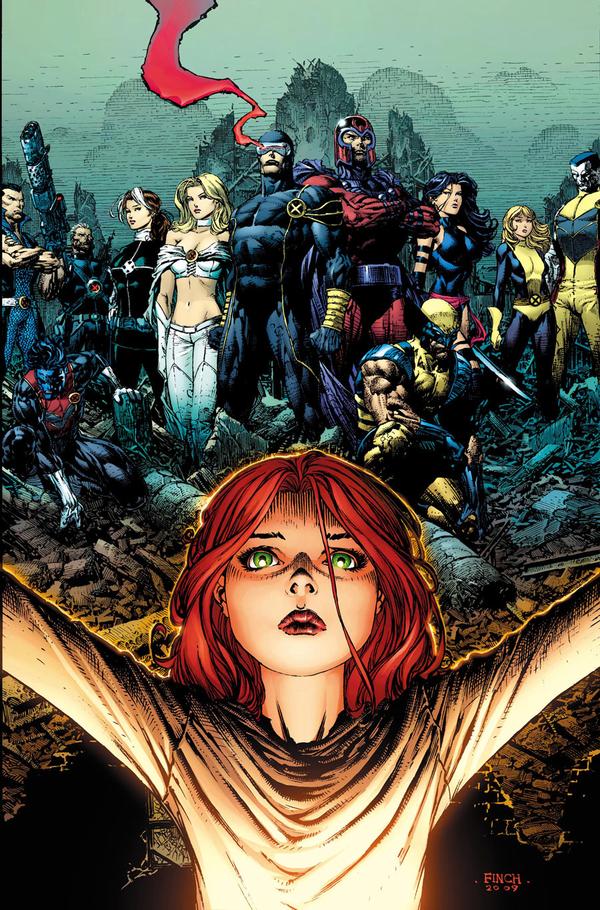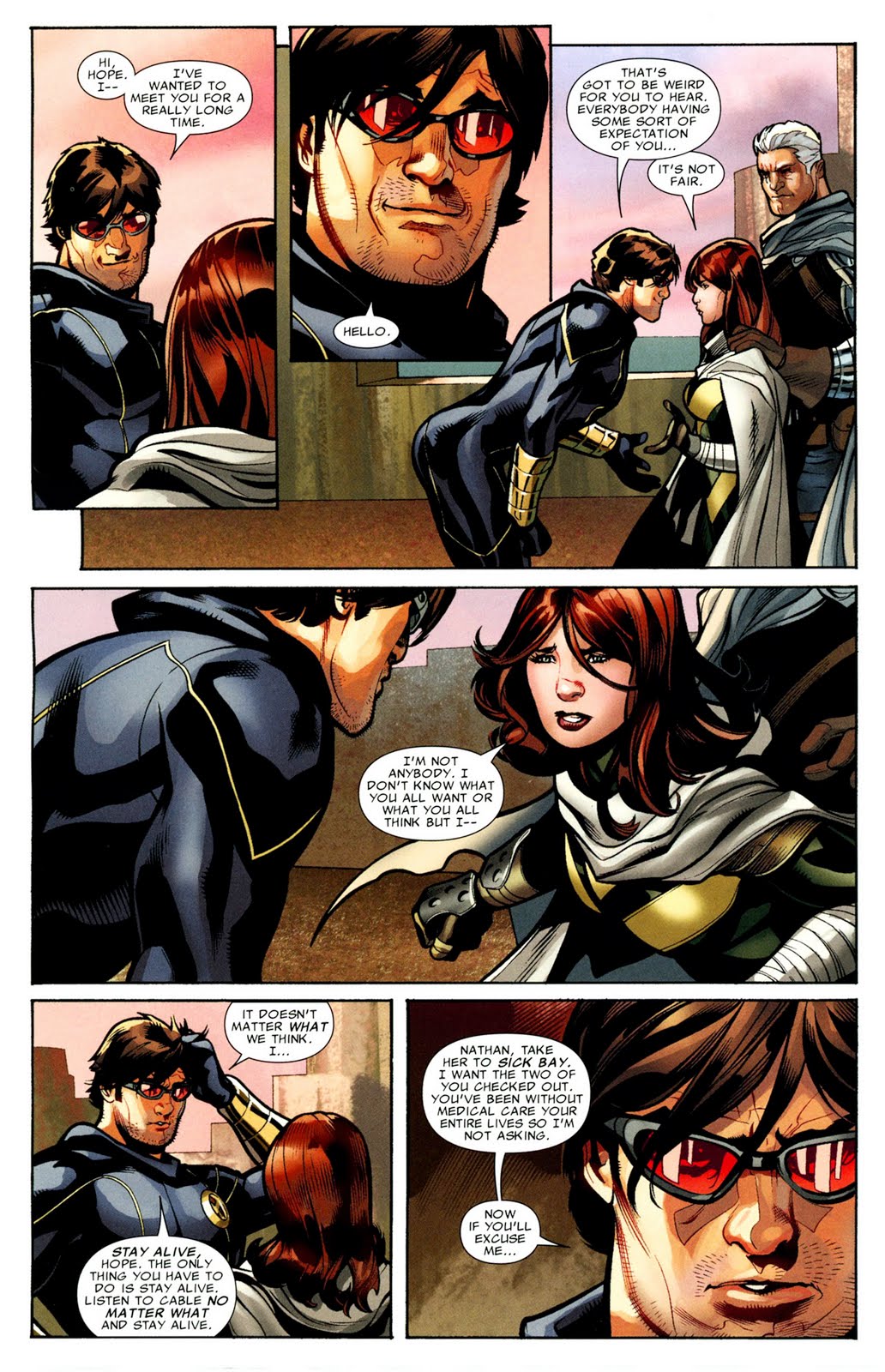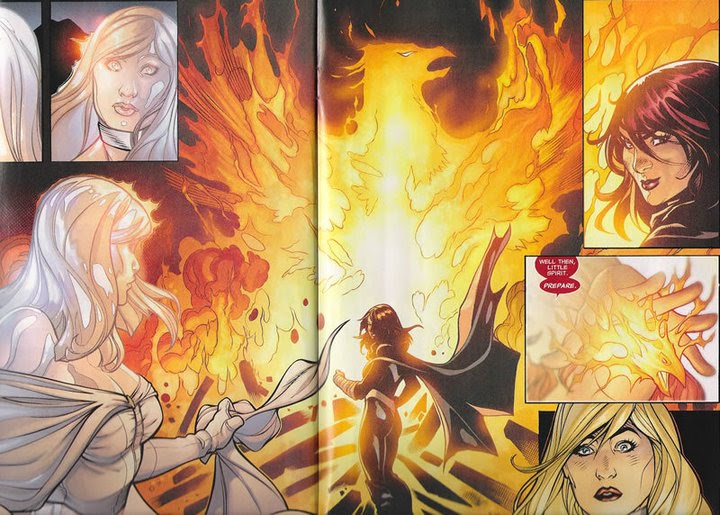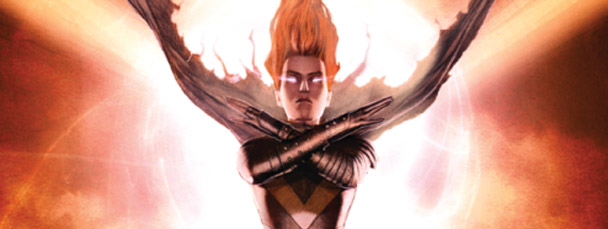Welcome to Comics Are My Religion, a look at theology through the lens of comic books.There are some basic ground rules about engaging in respectful dialogue about religion in this column. Be warned, if you haven’t read the comics discussed below, you might want to go read it and come back, as this column may contain spoilers!
 Hi again everyone! It’s been longer than I had hoped, but I’m back with another look at comic theology. It was a crazy summer, wasn’t it? Lots of big events coming to a close, not the least of which was the massive X-Men crossover Second Coming.
Hi again everyone! It’s been longer than I had hoped, but I’m back with another look at comic theology. It was a crazy summer, wasn’t it? Lots of big events coming to a close, not the least of which was the massive X-Men crossover Second Coming.

For those of you who have been living underground in a Morlock tunnel since April, the X-Men have been fighting for their survival against the ultimate mutant-hunting Sentinel, Bastion, and his League of Reincarnated Mutant Haters. Second Coming opened practically where previous X-over Messiah CompleX ended. Mutant soldier Cable left for the future with the so-called Messiah baby, named Hope Summers. In the Cable ongoing, we followed Cable and Hope through an inordinate amount of repetitious stories where they flee from ex-X-Man Bishop, who thinks Hope is the ultimate destroyer of the future of mutantkind. Despite numerous attempts, Bishop failed to kill Hope, and the Lone Wolf & Cub of mutantdom return to the present time. That’s where Second Coming starts.
Obviously, with a title like Second Coming, there are going to be some religious overtones. These overtones were set up in Messiah CompleX, where the mutant species as a whole begins to lose all hope that they will be able to continue on living after the mutants of the world were almost obliterated. However, one mutant child is born, and everything changes.
Almost every religion has that one person or divine revelation, that one spark, that sets off an entirely new movement. These are times that happen when the adherents to such religion are at their lowest point. That person or divine revelation brings about hope in the lives of human beings where once there was very little or none. Jesus of Nazareth brings about a call to compassionate and self-serving love in a time where religion was lifeless and self-serving. Siddhartha Gautama, a wealthy prince, explores the outside world and sees the pain and suffering of humankind. Seeing the hopelessness of his world, he begins to lead a prayerful and ascetic life, eventually reaching Enlightenment as the Buddha.
 In the same way, Hope’s birth sparks a new, but hidden hope for the future, where previously there was none. What is fascinating about Hope’s journey, though, and one that adherents to today’s religions might miss, is the confusion among those experiencing what’s happening in their present time. Christians today are not privy to the mindset of first century Palestine, although we can take some guesses. There were thousands of views about who Jesus was and what he came to do, varying from what we call orthodoxy today of Jesus being the Son of God, to those who thought he was a charlatan and criminal. In the same way, the question of Hope’s identity is still being played out in the X-Men books.
In the same way, Hope’s birth sparks a new, but hidden hope for the future, where previously there was none. What is fascinating about Hope’s journey, though, and one that adherents to today’s religions might miss, is the confusion among those experiencing what’s happening in their present time. Christians today are not privy to the mindset of first century Palestine, although we can take some guesses. There were thousands of views about who Jesus was and what he came to do, varying from what we call orthodoxy today of Jesus being the Son of God, to those who thought he was a charlatan and criminal. In the same way, the question of Hope’s identity is still being played out in the X-Men books.
Three characters in particular wrestle heavily with Hope’s “messiah-ship:” Cyclops, Nightcrawler, and Wolverine.
Cyclops is the leader of mutantkind. After Messiah CompleX, Cyclops fully became the general of a mutant army, tasked with keeping his species alive. His only ace-in-the-hole is his belief that Hope is the future of mutantkind. It is this faith in Hope that makes Cyclops choose some drastic measures in order to keep the species alive and protect her. Cyclops forms the black ops X-Force to cross lines the X-Men have rarely crossed in order to take the enemy out before they have a chance to kill more mutants. So when Hope returns to the present time, Cyclops moves all the players into battle immediately, with Hope’s protection being the highest priority. Most of the X-Men question Cyclops’s unwavering faith in Hope, since he has no empirical proof that she is who he thinks she is. This faith drives Cyclops to make horrible decisions, which eventually drives the Beast away from the X-Men completely.
One X-Man who starts off questioning Cyclops in Second Coming, but comes to full faith, is Nightcrawler. Nightcrawler is known as a man of faith as a Roman Catholic, but at the beginning of the story, Nightcrawler is unsure. He questions Cyclops about his certainty, but in the process of protecting Hope physically, he becomes convinced. Cyclops orders him and Rogue to take Hope while the rest of the X-Men distract Bastion’s minions from finding her. However, Bastion himself finds them and attempts to kill Hope. Just as Bastion is about to kill her, Nightcrawler teleports in front of her, and Bastion reacts, making Nightcrawler teleport into his arm. In a final act of faith, Nightcrawler teleports Hope to Utopia and saves her life just before he dies. This faith in Hope allows him to make the ultimate sacrifice.


Nightcrawler’s death shakes everyone, but no one more than Wolverine. While Logan follows Cyclops’s orders without question, he continually asks Cyclops if Hope was “worth it,” even more so after Nightcrawler dies. He then begins turning this question on Hope herself, which causes her to question her own role in why she even came back to the present time. Yet even though Wolverine questions Hope the most, he still continually fights for the X-Men and for Hope.

Everyone wrestles with the decisions that faith leads them to, and Cyclops, Nightcrawler, and Wolverine are just a few. However, just like in real life, something happens to confirm that faith within believers. Call it a “miracle,” or a “sign,” but things happen to Hope in the story that make believers out of almost everyone. Bastion’s forces have all but decimated the X-Men, trapping them in an impenetrable bubble, forcing them to fight hundreds of Nimrod robots from the future. The man who raised Hope, Cable, even gives his life to save Hope and all of mutantkind. His death drives Hope into a fury, causing her mutant power to manifest. She single-handedly defeats all the Sentinels and destroys Bastion. The X-Men stand back in awe at her power, which incorporates all of their powers in one. People begin to think that maybe Hope really is the Messiah.
But later, after the funerals and clean-up, something else happens. Cerebra, the mutant-detecting computer, who hasn’t registered a new mutant since Hope herself, registers five new mutant lights in the world. Cyclops’s faith in Hope is confirmed as the one who will bring mutants out of extinction. Where there once was no “hope” for the survival of mutants, Hope brings a way for mutants to look at the future with new and expectant eyes. Their faith in her inspires hope for their whole species.
 What will happen next is up for grabs, but Second Coming does create quite a parable for us as well. We live in a world with lots of fear and not a lot of hope. But no matter what our religious background, our faith can inspire us to drive out that fear and have hope that things of this world will not always be grim. Faith drives us to hope, and hope moves us to love, and love draws us to serve and make the world a better place.
What will happen next is up for grabs, but Second Coming does create quite a parable for us as well. We live in a world with lots of fear and not a lot of hope. But no matter what our religious background, our faith can inspire us to drive out that fear and have hope that things of this world will not always be grim. Faith drives us to hope, and hope moves us to love, and love draws us to serve and make the world a better place.
So who will we be? Is there a kernel of faith within us? It may not be faith in God, or the tenets of a certain religion, but maybe it’s merely faith that the world can be better than it is now, and we can do something about it. Luckily, we don’t have to fight killer robots who want to wipe out our species, but all of us have experiences that develop our faith and shape who we are.
And when there’s faith…there’s Hope.
Jeff Jackson
jeff@comicattack.net



Fantastic piece Jeff! And for the record I happen to like my Morlock Tunnel thank you very much! lol
Great job indeed Jeff! I really enjoyed this, I think Second Coming might get me back into the X-Men.
Pingback: Tweets that mention Comics Are My Religion: Faith, HOPE, & Killer Robots -- Topsy.com
Good to see you back at it Jeff!